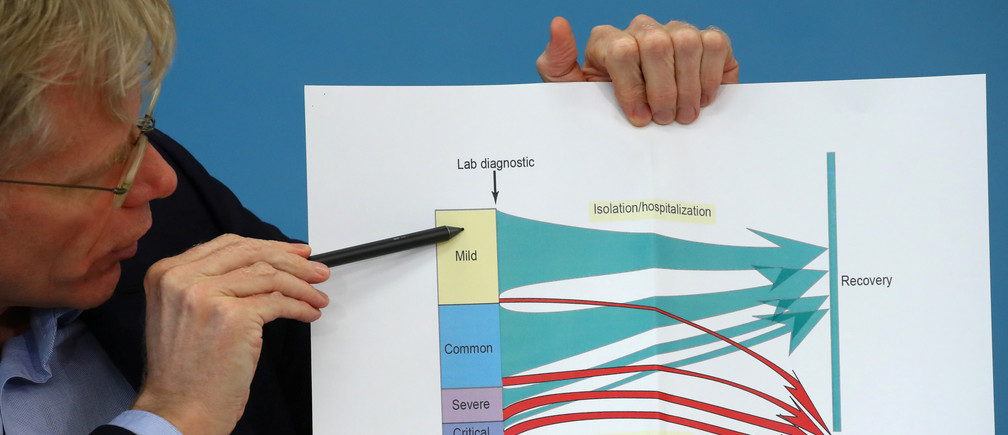Facts, not fear, will stop COVID-19 - so how should we talk about it?

Stick to the facts - and avoid the stigma. Image: REUTERS/Denis Balibouse
- "Words matter": World Health Organization issues guidelines to media.
- Stick to the facts, don't spread rumours, and avoid stigmatizing patients.
- Poor information could help disease spread; good info could help halt it.
It's not a “plague” or an “apocalypse”; it's not a “Chinese” or “Asian" disease; and people with COVID-19 should not be described as “spreading the virus”.
These are some of the recommendations from the World Health Organization as it urges the media to ensure their Coronavirus coverage does not stoke panic or stigmatize parts of society.
"(W)e are often afraid of the unknown; and it is easy to associate that fear with ‘others’," the WHO says in its guidelines published after reports of racist abuse in some countries and the spread of false information online.
If the media can help educate people, COVID-19 will be better understood, and less scary. the WHO says. And if the media are more careful with language, they can help reduce the stigmatization of people who catch the virus.
"Stigma can undermine social cohesion and prompt possible social isolation of groups, which might contribute to a situation where the virus is more, not less, likely to spread," the WHO says. In short, if people are trying to hide their illness to avoid discrimination, they are less likely to get tested or treated.
Here are some of the WHO's dos and don'ts for the media:
We need to talk about COVID-19
DO - talk about the new coronavirus disease (COVID-19)
DON'T - attach locations or ethnicity to the disease, this is not a “Wuhan Virus”, “Chinese Virus” or “Asian Virus”. The official name for the disease was deliberately chosen to avoid stigmatisation - the “co” stands for Corona, “vi” for virus and “d” for disease, 19 is because the disease emerged in 2019.
DO - talk about “people who have COVID-19”
DON'T - refer to people with the disease as “COVID-19 cases” or “victims”
DO - talk about people “acquiring” or “contracting” COVID-19
DON'T - talk about people “transmitting COVID-19” “infecting others” or “spreading the virus” as it implies intentional transmission and assigns blame.
"Using criminalising or dehumanising terminology creates the impression that those with the disease have somehow done something wrong or are less human than the rest of us, feeding stigma, undermining empathy, and potentially fuelling wider reluctance to seek treatment or attend screening, testing and quarantine," the WHO says.
"Evidence clearly shows that stigma and fear around communicable diseases hamper the response. What works is building trust in reliable health services and advice, showing empathy with those affected, understanding the disease itself, and adopting effective, practical measures so people can help keep themselves and their loved ones safe."
Stick to the facts
DO - speak accurately about the risk from COVID-19, based on scientific data and latest official health advice.
DON'T - repeat or share unconfirmed rumours, and avoid using hyperbolic language designed to generate fear like “plague”, “apocalypse” etc.
An “infodemic” of misinformation and rumours is spreading more quickly than the current outbreak of the new coronavirus
”Be positive
DO - talk positively and emphasise the effectiveness of prevention and treatment measures. For most people this is a disease they can overcome.
DON'T - There are simple steps we can all take to keep ourselves, our loved ones and the most vulnerable safe. Don’t - emphasise or dwell on the negative, or messages of threat.
DO - emphasise the effectiveness of adopting protective measures to prevent acquiring the new coronavirus, as well as early screening, testing and treatment.
What is the World Economic Forum doing about the coronavirus outbreak?
Don't miss any update on this topic
Create a free account and access your personalized content collection with our latest publications and analyses.
License and Republishing
World Economic Forum articles may be republished in accordance with the Creative Commons Attribution-NonCommercial-NoDerivatives 4.0 International Public License, and in accordance with our Terms of Use.
The views expressed in this article are those of the author alone and not the World Economic Forum.
Stay up to date:
COVID-19
Related topics:
Forum Stories newsletter
Bringing you weekly curated insights and analysis on the global issues that matter.
More on Health and Healthcare SystemsSee all
Mansoor Al Mansoori and Noura Al Ghaithi
November 14, 2025








